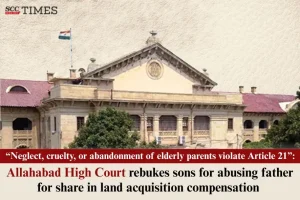Allahabad High Court: In a writ petition filed by a 75-year-old plus, visibly infirm, man regarding release of the compensation that he was supposed to receive from the State due to the acquisition of his land and its structure, the Division Bench of Mahesh Chandra Tripathi and Prashant Kumar, JJ., disposed of the petition while directing that the entire compensation amount be released in favour of the petitioner at the earliest. Noting that the petitioner was abused by his sons for their share in the compensation, the Court directed that if the sons caused any annoyance or interference in the future, the petitioner shall be at liberty to file a recall application, and the High Court shall not hesitate to pass appropriate and stringent orders.
Background
The petitioner’s land and the structure thereupon were acquired by the State. After the compensation of Rs 21.17 Lakhs was fixed for the same, the relationship between him and his sons became strained. They quarrelled with and committed atrocities against the father, forcing him to lodge an FIR against them.
The sons, settled in Surat and Mumbai respectively, contended that they were also entitled to the compensation because they contributed to the construction of the superstructure. They also submitted that they were willing to apologize to their father and settle the dispute.
The petitioner filed the present writ petition seeking the release of compensation in his favour.
Analysis
At the outset, the Court noted that the primary impediment to the disbursal of compensation was the bitter and unfortunate conflict between the petitioner and his sons. The Court remarked that it was deeply unsettling that no sooner was the compensation announced than the petitioner was subjected to acts of aggression and cruelty by his children.
“There exists no greater societal failure, no deeper moral bankruptcy, than when a civilised society turns away from the silent suffering of its elders.”
Furthermore, the Court expressed the deep anguish due to the sheer apathy and misconduct displayed by the children. The Court remarked,
“Parents spend the most vital years of their lives toiling for the nourishment, education, and future of their children, often with no expectation in return. But to be repaid in the winter of their lives with cruelty, neglect, or abandonment is not only a moral disgrace but also a legal violation.”
The Court further underscored that it was both a sacred moral duty and a statutory obligation for children to protect the dignity, ensure the well-being, and take care of their ageing parents.
“As their physical strength wanes and ailments rise, they do not seek charity; they seek security, empathy, and companionship from the very hands they once held and nurtured. In these final years, even the smallest act of reassurance or respect can carry the greatest weight.”
The Court added that Courts, in their role as protectors of the vulnerable, must rise as the last bastion of compassion when filial duty collapses. The law must speak firmly and clearly in the defence of aged parents, and ensure that they live not just in sustenance but in dignity.
“The twilight of life must not be marked by silence, isolation, or pain. No civilised society can condone, let alone ignore, such betrayal of our elders.”
The Court also stated that neglect, cruelty, or abandonment of elderly parents was a violation of Article 21 of the Constitution. The law codifies what should already exist in every heart, an instinctive human responsibility to care for those who once protected us. A home that has turned hostile for an ageing parent is no longer a sanctuary; it is a site of injustice. The Courts must not allow this silent suffering to continue under the garb of family privacy.
The Court noted that the petitioner narrated, with deep pain and distress, how his sons subjected him to physical and emotional trauma. He alleged that they even went so far as to physically bite him and displayed the injuries sustained at their hands to the Court. Despite this appalling conduct, the petitioner, with a father’s heart full of forgiveness, expressed that he would, out of his own volition, share a portion of the compensation with his sons.
The Court further noted that the sons had tendered their unconditional apology before this Court and assured that no such unfortunate conduct shall occur in the future. They also contended that they would willingly accept whatever portion of compensation that the petitioner chose to give them.
Regarding the FIR lodged by the petitioner against his sons, the Court noted that a Panchayat intervention had led to an amicable settlement.
In light of the undertakings given by the petitioner and his sons, and the State’s assurance that compensation shall be released at the earliest in favour of the petitioner, the Court stated that there was no need to issue any further direction at this stage. However, the Court clarified that if the sons caused any annoyance or interference in the future, the petitioner shall be at liberty to file a recall application, and this Court shall not hesitate to pass appropriate and stringent orders.
Accordingly, the Court disposed of the petition while directing that the entire compensation amount be released in favour of the petitioner at the earliest.
[Ram Dular Gupta v. State of U.P., 2025 SCC OnLine All 4436, decided on 18-07-2025]
Advocates who appeared in this case :
For the petitioner: Ganga Dhar Shukla
For the respondent: Additional Chief Standing Counsel Ambrish Shukla and Rajesh Kumar Jaiswal


